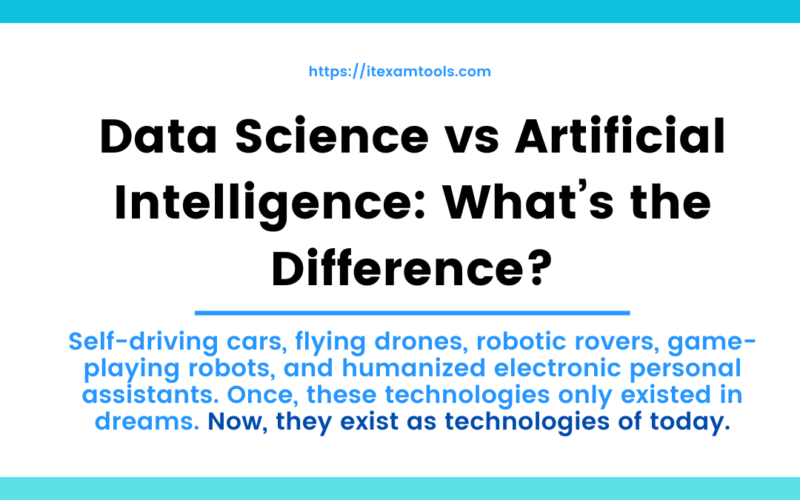Smart Phone Remote Controller ● Widespread Compatibility: Your smartphone can function effectively with the standard connector that is frequently used to replace iOS cellphones.● Plug and Play: Your smartphone may become an…
Data Science vs Artificial Intelligence: What’s the Difference?

Deciphering Data Science and Artificial Intelligence: Unveiling the Nexus of Insight and Intelligence
Self-driving cars, flying drones, robotic rovers, game-playing robots, and humanized electronic personal assistants. Once, these technologies only existed in dreams. Now, they exist as technologies of today.
Technology fields like data science and artificial intelligence (AI) are interwoven with your life. Careers in data science and artificial intelligence can offer interesting, well-paying work.
Learn more about the fascinating fields of data science and artificial intelligence.
Data Science vs Artificial Intelligence(AI) are two dynamic and intertwined domains that have revolutionized the way we harness information and drive technological advancements.
While they share common threads, they each have distinct roles and focuses within the realm of computing. Data Science is a multidisciplinary field that centers on extracting meaningful insights from complex and voluminous datasets.

It involves a blend of statistics, programming, domain expertise, and data visualization techniques to uncover patterns, trends, and correlations.
Data Scientists are adept at cleaning, transforming, and analyzing data to facilitate informed decision-making.
They create models and predictive algorithms that aid businesses in identifying opportunities, optimizing processes, and gaining a competitive edge.
In essence, Data Science empowers organizations to harness the power of data and convert it into actionable knowledge.
On the other hand, Artificial Intelligence is a broader concept encompassing the development of machines or systems that can simulate human-like intelligence.
AI focuses on creating algorithms and models that enable computers to perform tasks that would typically require human intelligence.
These tasks range from natural language processing and image recognition to problem-solving and decision-making.
While Data Science is a subset of AI, AI extends beyond data analysis to encompass the creation of intelligent systems that can learn, adapt, and make autonomous decisions.
It includes machine learning techniques, where algorithms iteratively improve their performance based on data and experience.
In summary, Data Science serves as the engine that fuels AI, providing the insights and patterns necessary for intelligent systems to make informed decisions and predictions.
In totality, Data Science and Artificial Intelligence are complementary forces driving innovation and transformation across industries.
Data Science lays the foundation by uncovering hidden gems within datasets, while Artificial Intelligence leverages these insights to create intelligent systems that mimic human cognitive functions.
The distinction lies in their focus: Data Science extracts knowledge from data, while AI applies that knowledge to perform tasks and solve problems.
As technology continues to evolve, the synergy between Data Science and Artificial Intelligence promises to reshape our world, from personalized recommendations and medical diagnoses to self-driving cars and smart cities, propelling us into a future where machines augment human capabilities in unprecedented ways.

Data Science Overview
Data science — an in-demand, future-proof field — is an interdisciplinary specialty consisting of computer science, mathematics, statistics, and information processing.
Data science is interwoven with many other fields like biology, artificial intelligence, computer science, healthcare, economics, ecological engineering, and linguistics.
What Do Data Scientists Do?
Data scientists use computers, algorithms, and systematic work processes to collect, clean, organize and analyze data in useful ways. They explore data to find patterns, extract actionable insights, and answer important questions.
As a data scientist, you can work with qualitative or quantitative data on nearly any subject such as:
- Astronomical solar system surveys (e.g. tracking near-Earth objects)
- Ecosystem monitoring (e.g. analyzing animal and plant surveys)
- Epidemiological disease tracking (e.g. tracking coronavirus, malaria, or flu)
- Artificial intelligence (e.g. developing datasets for machine learning or computer vision)
- Environmental sustainability (e.g. managing greenhouse gases and environmental pollutants)
A typical day working in data science can entail:
- Collecting, transforming, and analyzing large amounts and/or unique types of data
- Performing statistical analysis of data
- Generating visualizations and models from data
- Composing reports about insights drawn from data
- Solving business-related questions or problems with data
- Communicating with fellow professionals about data
Which Skills and Tools Do Data Scientists Use?
Data scientists use knowledge, skills, and analytical techniques from many subjects including:
- Applied mathematics: math with application to different disciplines (e.g. physics, engineering, biology)
- Statistics: math focused on collection, analysis, interpretation, and representation of data
- Information visualization: the study and design of visual representations of knowledge (often interactive) to aid human conceptual understanding
- Analytics: systematic logical analysis of data and/or statistics
- Computer programming: the process of designing and building computer programs to achieve specific tasks
- Communications: techniques and technologies for transmitting information
Data scientists use many computer languages, tools, and platforms to process data such as:
Computer Programming Languages
Data Visualization Tools
Computing Platforms
- IBM’s Watson Studio
- Dataiku
- Anaconda
- MATLAB
- Databricks
Artificial Intelligence Overview
Artificial intelligence describes a discipline focused on computing to mimic human behaviors and complete human tasks. Artificially intelligent technologies use massive amounts of data (prepared by data scientists), as well as learning methods like machine learning and deep learning. They also use computer learning models (e.g. neural networks) and high-capacity computing platforms (e.g. cloud computing).
Like data science, artificial intelligence supports and synergizes with other fields including medicine, autonomous vehicle engineering, virtual reality, robotics, linguistics, and bioinformatics.

What Do Artificial Intelligence Specialists Do?
Artificial intelligence specialists conduct varied projects across focal areas of AI. You can pursue machine learning, natural language processing, computer vision, autonomous driving, deep learning, healthcare, or robotics while working in AI.
You can specialize in different kinds of technologies including:
- Humanized robots (e.g. caretaking/companion robots, game-playing robots)
- Self-driving cars (e.g. Waymo One)
- Autonomous flying drones (e.g. drones for wildfire monitoring or landscape surveying)
- Disease-detecting or disease-diagnosing applications (e.g. an AI cough assessment app)
A typical day working in artificial intelligence can entail:
- Designing and developing computer algorithms, data structures, learning models, and devices
- Programming computers using different programming languages
- Testing learning models and software architectures
- Reviewing algorithms, machine functions, learning models, and AI devices
- Composing technical documentation explaining your work
- Communicating technical concepts with fellow professionals
Which Skills and Tools Do Artificial Intelligence Specialists Use?
AI specialists and data scientists use overlapping skillsets. Artificial intelligence specialists require strong proficiencies in software engineering and computer science. AI specialists work with:
- Software engineering: a form of engineering dedicated to software development, operation, and documentation
- Computer science: computing that includes computer design, software development, and information processing
- Probability: a branch of mathematics focused on describing the likelihood of an event or truthfulness of a proposition
- Machine learning and deep learning: Machine learning refers to the design, implementation, and operation of artificially intelligent computers with algorithms that learn and improve on their own. Deep learning is an expansion of machine learning.
- Data structures and algorithms: Data structures are computer science formats for storing, organizing, and managing data that enable users to access and modify the data. Algorithms are well-defined computer instructions for performing computations or solving problems.
AI specialists and data scientists use many of the same popular computer programming languages (see list above).
Artificial intelligence specialists also use computing platforms such as:
- Microsoft Azure
- Amazon Web Services
- Google Cloud
- IBM Cloud
- TensorFlow
- PyTorch

Data Science vs Artificial Intelligence
Data Science and Artificial Intelligence in Action
Data scientists and artificial intelligence specialists benefit each other through the creation and use of models, datasets, algorithms, and tech products for computing and information analysis. People and machines can process and understand ever-greater amounts of data.
Together, data scientists and AI specialists help people across industries including business managers, financial analysts, and product manufacturers (e.g. automobile or computer manufacturers).
AlphaGo, AlphaZero, MuZero, and AlphaStar are AI computers that learned how to play complex games like chess, shogi, Go, Atari, and Starcraft II using deep learning.
Self-driving cars generate and process data and AI algorithms via complex sensor systems to safely navigate.
Technologists train AI computers with big data, machine learning, and deep learning algorithms. Massive datasets and AI algorithms enable automated facial recognition, disease diagnosis, and natural language processing.
Understand Data Science and Artificial Intelligence With Udacity
Data science and artificial intelligence consist of interesting skills, compelling projects, and attractive work. Online learning platforms like Udacity offer opportunities for you to develop industry-relevant skills in data science and AI such as:
- Become a Data Scientist
- Data Visualization
- Intro to Machine Learning with TensorFlow
- AI for Healthcare
- Become a Computer Vision Expert
Learn more by registering for one of Udacity’s many interesting Nanodegree programs today!
Data Science vs Artificial Intelligence
Learn more at








